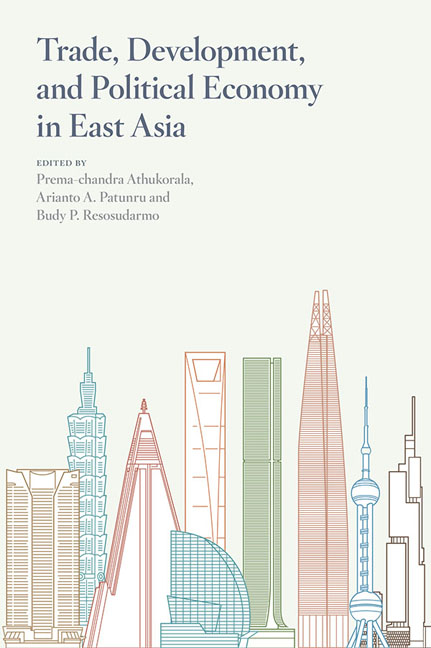Book contents
- Frontmatter
- Contents
- Tables
- Figures
- Contributors
- Foreword
- Acknowledgments
- Glossary
- 1 Introduction
- PART 1 TRADE
- 2 Challenges of the world trading system and implications for Indonesia
- 3 From spaghetti bowl to jigsaw puzzle? Addressing the disarray in the world trade system
- 4 Agricultural trade consequences of Asia's economic growth: a case study of wine
- PART 2 DEVELOPMENT
- PART 3 POLITICAL ECONOMY
- References
- Index
2 - Challenges of the world trading system and implications for Indonesia
from PART 1 - TRADE
Published online by Cambridge University Press: 19 May 2017
- Frontmatter
- Contents
- Tables
- Figures
- Contributors
- Foreword
- Acknowledgments
- Glossary
- 1 Introduction
- PART 1 TRADE
- 2 Challenges of the world trading system and implications for Indonesia
- 3 From spaghetti bowl to jigsaw puzzle? Addressing the disarray in the world trade system
- 4 Agricultural trade consequences of Asia's economic growth: a case study of wine
- PART 2 DEVELOPMENT
- PART 3 POLITICAL ECONOMY
- References
- Index
Summary
The world trading system has undergone a lot of flux and encountered great challenges in the last two decades. We have seen an increase in bilateral and regional free trade agreements (FTAs) as the multilateral trading system has faltered in its bid to reach agreement under the long-drawn-out Doha Development Agenda. Since the Asian financial crisis, the issue of a multipolar world and different speeds of development among developing countries is emerging. The way we do trade has also changed dramatically, moving from trading in goods produced from beginning to end in each country, to global production sharing, trade in parts and components, and final assembly within global production networks. The global economic crisis in 2008 has also led to tensions and to challenges to the multilateral trading system and institutions.
The purpose of this chapter is to discuss challenges facing the world trading system, policy priorities for safeguarding the integrity of a global rules-based trading system, and their implications for Indonesia. It begins with an overview of the current state of the world trading system. This is followed by a discussion of policy changes. The penultimate section looks at the likely implications of the policy options under consideration for Indonesia and how the country should position itself in the ongoing policy dialogue.
THE CONTEXT
Despite the seeming chorus of anti-trade or anti-globalisation voices, trade continues to be an important engine of growth, job creation, and poverty reduction. Countries such as Indonesia, a large developing country, have seen their economies transformed by trade and the opening up of the economy. The imperative has not changed. Trade should remain an important engine of growth, especially given that sustainable recovery in the world economy continues to elude us.
During the global crisis of 2008–2009, world trade contracted by almost 20 percent (Almunia et al. 2010). However, the fear of protectionism and a ‘second’ great depression abated and most of the emerging economies rebounded in 2010–2011. The G20 leaders and others have seen the importance of ensuring trade continues to flow and called for a standstill or refraining from protectionism. Even though some protectionist measures were taken by some countries in the aftermath of the crisis, the existence of the rules-based framework and the peer-pressure review introduced by G20 helped minimise increased protectionism.
- Type
- Chapter
- Information
- Trade, Development, and Political Economy in East AsiaEssays in Honour of Hal Hill, pp. 13 - 25Publisher: ISEAS–Yusof Ishak InstitutePrint publication year: 2014

